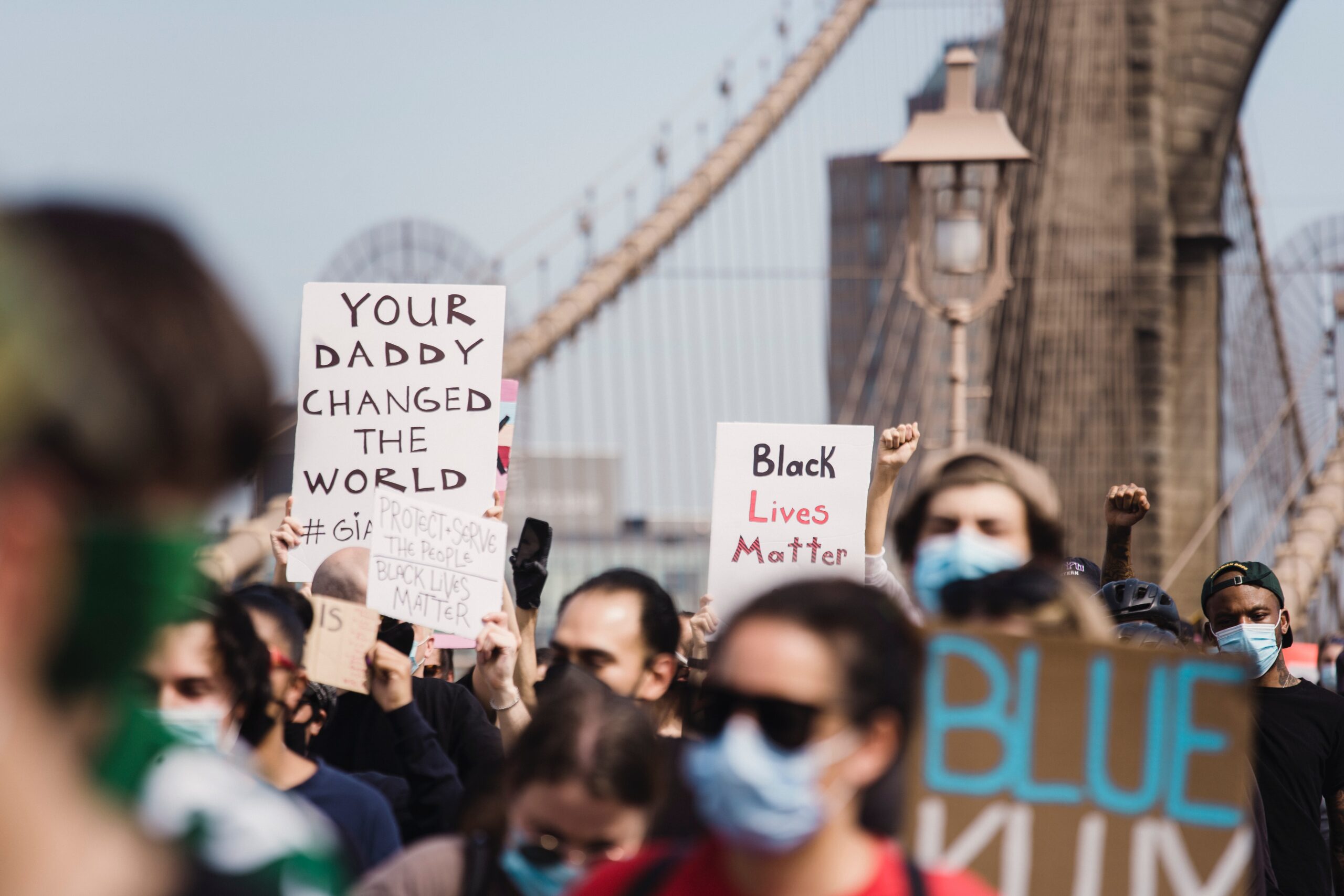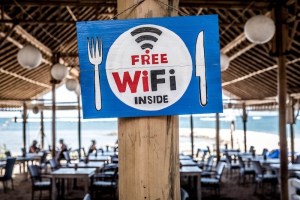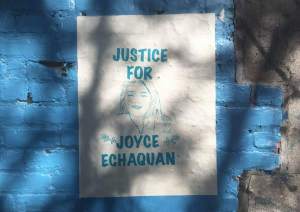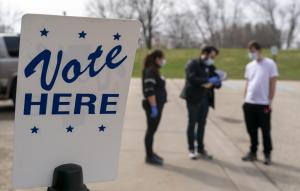“The existence of law enforcement is neither a sign of order nor safety. It is a fundamental flaw within our society, which treats crime as a reactive measure to penalize and discipline individuals instead of instituting measures that would rehabilitate and prevent crime by addressing its root causes.”
—from the Defund the SPVM Coalition’s Mission Statement
In the wake of the lethal COVID-19 pandemic, police officer Derek Chauvin’s murder of George Floyd sparked defiant opposition to an equally lethal and ongoing crisis: the violence against people of colour by police officers. Crimes such as this are, sadly, nothing new; what is new, however, is the intense and sustained civil disobedience and protesting in support of the Black Lives Matter Movement. Although George Floyd’s death was the straw that broke the camel’s back, it is the sheer culmination of deaths among people of colour both in Canada and the United States that has brought the continuous wave of mobilization. People are demanding justice not only George Floyd, but for Ahmaud Arbery, Breonna Taylor, Regis Korchinski-Paquet, Chantel Moore, Eishia Hudson, Jason Collins, Stewart Kevin Andrews, Everett Patrick, Trayvon Martin, Atatiana Jefferson, Bothem Sean, Philando Castile, Eric Garner, and many more, both reported and unreported. Many in Canada were quick to compare our country favourably to the United States, yet six of the fourteen listed above were killed by Canadian police. Here in Canada, Black and Indigenous people are 4 to 5 times more likely than white people to be stopped by Montreal police. Indigenous people represent 58 of those killed by police in Manitoba and 62 percent of those killed by police in Saskatchewan. And In Toronto, Black people are 20 times more likely to be shot dead by the police. That Canada is less racist than the United States is a dangerous argument to make when the systems that purportedly keep people safe continue to disproportionately kill people of colour.
“It’s systemic,” says Marlihan Lopez, a member of Black Lives Matter, Program and Outreach Coordinator at the Simone de Beauvoir Institute, and Vice-President of the Quebec Women’s Federation. “It’s not a matter of a couple of cops, it’s a matter of institutions that historically were created to oppress certain communities and to protect white supremacy. It’s not one cop, two cops, it’s an institution that needs to be rethought and we need to recognize the heritage of these institutions.”
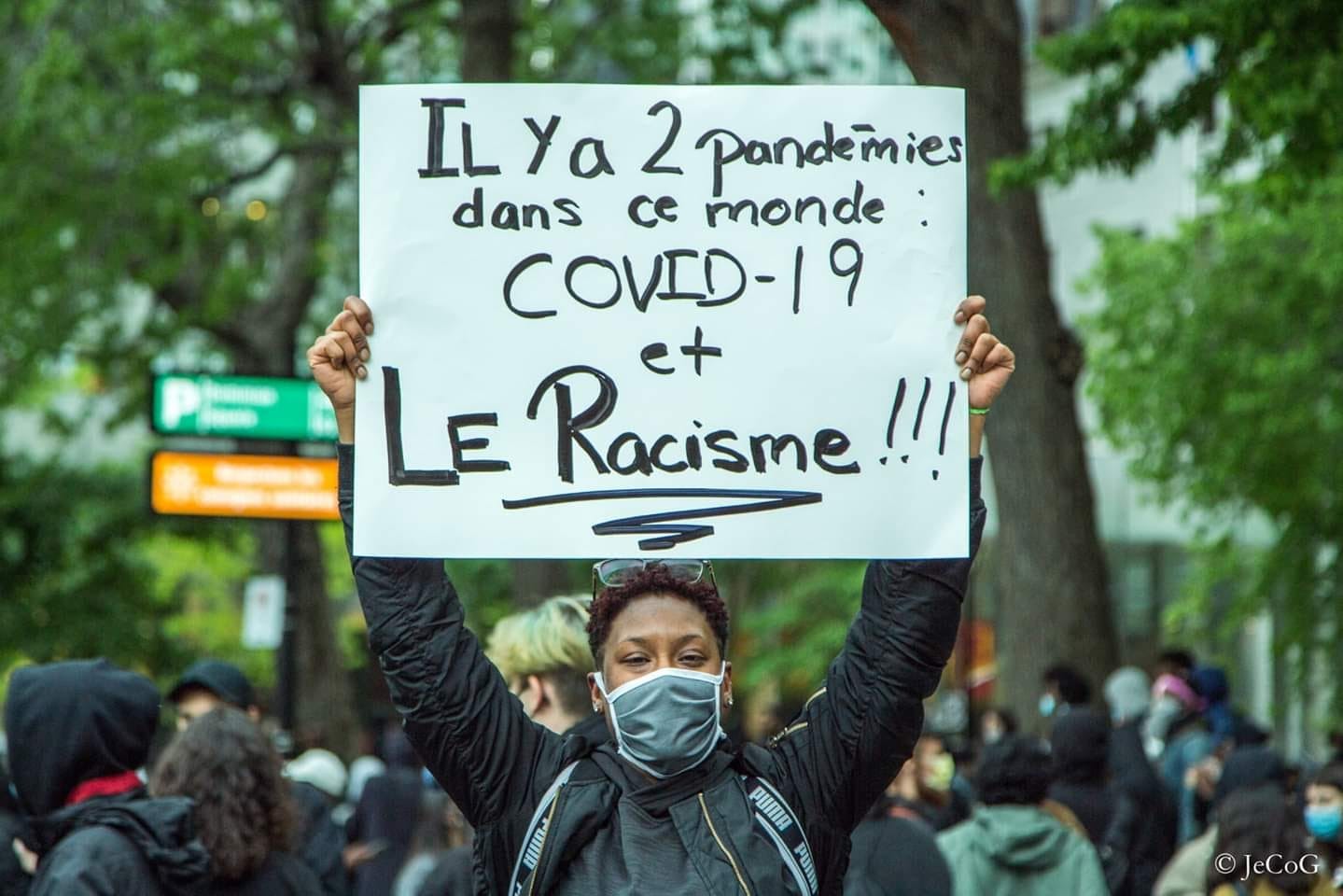
Anti-racism Protest in Montreal
#DefundTheSPVM
Following almost weekly anti-racism protests in June and July that drew thousands of allies and supporters, a coalition of over 40 organizing groups and collectives formed around a call on the municipal government to cut 50% of the SPVM’s (Service de police de la Ville de Montréal) budget—which, in 2019, reached more than $662 millionf. This diverse coalition, made of up of racial justice groups, climate justice groups, student collectives, women’s shelters, and sex work organizations sat down together [virtually] to draft 10 demands centered around “deconstruct[ing] the mechanisms we have relied on to “protect the lives and wellbeing of citizens.” Early on in the summer, Mayor Valérie Plante did in fact voice her support for the broader Black Lives Matter movement, yet no concrete steps have been made to change the nature of policing in Montreal. In a similar act of allyship, the SPVM officers were set to march with protestors on June 7 despite their decades of systemic racial profiling and violence. According to Marlihan Lopez, the inclusion of police in an anti-police march is “bullshit.
“I think it’s performative and I think it’s even gaslighting for people who have had experiences of police violence to see police officers try to shut down conversations, try to shut down active resistance through performative tactics,” says Lopez. “If they had any type of respect for communities, they would have sat it out and let our communities march.”
Due to backlash, the SPVM was promptly uninvited to the march. “The only way for police officers to be allies is for them to divest themselves of their power and material resources,” says Nathalie Batraville, Assistant Professor of gender and sexuality studies at Concordia. In doing so, “our communities could have a real chance at reducing and breaking cycles of violence, supporting those struggling with mental illness or addiction, focusing on treatment and healing, and facilitating accountability and justice without punishment and cages.”
Without systemic change, any gesture by an institution that targets and kills minorities is hollow, and even dangerous. The standard “not all cops are bad” argument, according to Batraville, “is premised on a framework in which police misconduct is the problem […] Defunding the police as a framework understands that police “misconduct” is a natural outcome of the work of policing itself and that the police cannot be reformed.” In spite of the growing support for defunding over reforming, Valérie Plante has confirmed that the municipal government will implement a new street-check policy, as well as equip police officers with body cameras. Evidently, the Projet Montréal government fails to understand “the everyday work of so-called “good cops”,” as Batraville puts it, “to be harmful to our communities because it leads to their criminalization and because it takes resources away from programs and services led and managed by our communities themselves that would actually address our needs and our visions for safety and wellness.”
The SPVM’s media team did not wish to comment on the Defund the Police movement in Montreal.
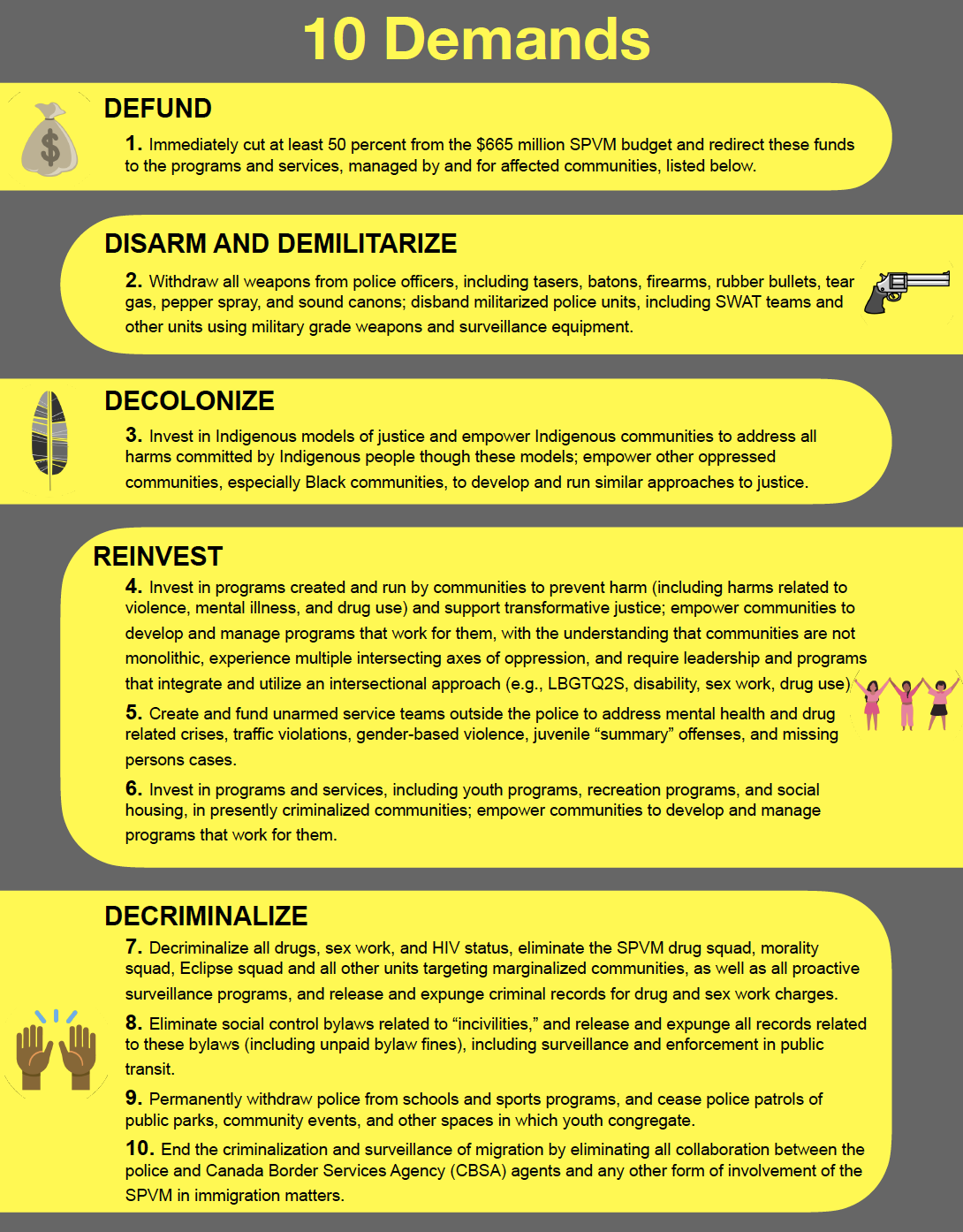
The 10 Demands of the Defund the SPVM Coalition
Through continued mobilization and awareness-building, change is happening at the governmental-level. In Minneapolis, where Derek Chauvin murdered George Floyd, the city council is taking first steps to defund and dismantle the city’s police department and move toward a new model of public safety. In a similar move, the mayor of Los Angeles promised to reinvest $150 million of the city’s police budget into community and mental health initiatives. Recently, however, Toronto city council refused to reduce the police budget,and voted instead in favour of reforms, such as the creation of a non-police response team for mental health calls and the requirement that all officers wear body cameras by 2021. Regardless of the municipal government’s actions here in Montreal, Lopez affirms that nothing will deter the movement.
“We know it’s an uphill battle […] and we’re ready to do the work. We’re ready to do teach-ins, we’re ready to do popular education, so people can understand that this is not out of reach, this is possible, this is not utopic. We can push for change.”
Intersecting Crises
The Defund the Police coalition represents a nexus of intersecting crises.In fact, the 50% budgetary slash is just one of the ten measures that the coalition has identified. As Lopez explains, “when we talk about police violence, the communities that are most affected are Black and Indigenous communities. So, it is about racial justice. Even if you take climate change and you censure the margins, you can’t talk about climate change and climate justice without talking about environmental racism, that, for example, our Indigenous communities have been facing for decades.” In a similar vein, Batraville places emphasis on the systemic “logic of racialized disposability at the heart of capitalism that fuels at once criminal punishment and policing and environmental degradation.” To that end, large fossil fuel corporations, who have a vested interest in maintaining the status quo, have long supported police institutions.
The Defund the SPVM movement is much larger than the budget of the SPVM; its wider aims are for decolonization and decriminalization. For instance, “defunding is strongly linked to denunciation movement in terms of sexual violence,” says Lopez.
She goes on to say that “the majority of survivors of sexual violence do not disclose to the police. And the majority that do are re-victimized after their encounter. And so for those of us that work on sexual violence, we know that the police does not constitute an option for most survivors. That’s one example of work that can be taken away from them [the police], and the money could be reinvested in resources for survivors of sexual violence. Here in Montreal, you have a lack of resources in Montreal North, but you have the North of Quebec in Indigenous communities with no resources for survivors of sexual violence. If we know that the police is not equipped to deal with sexual violence, why are they receiving funding to do so when there are so many communities that do not have access to resources in terms of sexual violence?”
The aims of the coalition are, to Lopez, “really broad.” The campaign “involves getting the police out of schools, and investing because it’s not just defunding. It’s defunding to reinvest in community and housing and youth programs.We have community organizations that, depending on their experience and expertise, will be working on specific measures. We’re going to continue that work and a lot of it does involve popular education.”
Popular Education
The question at which many arrive is what can I do?
According to the organizers on the ground, raising awareness is the first step, for yourself and for others around you. Beyond that, there’s no shortage of actions that individuals can take:
“People can write to their elected officials” suggests Batraville, “starting at the municipal level, asking them to defund the police and reinvest in programs and initiatives by and for communities who are most criminalized. People can have conversations with their friends and family about alternatives to calling the police. Find out which organizations and community workers in your neighborhood you can reach out to the next time someone around you is having a crisis or might be getting themselves into trouble. Donate to the organizations that are members of the coalition and attend events and protests.”
These acts of solidarity must be centered around “believing that we have a responsibility and even a duty to call out social injustice even if it doesn’t affect us,” adds Lopez.
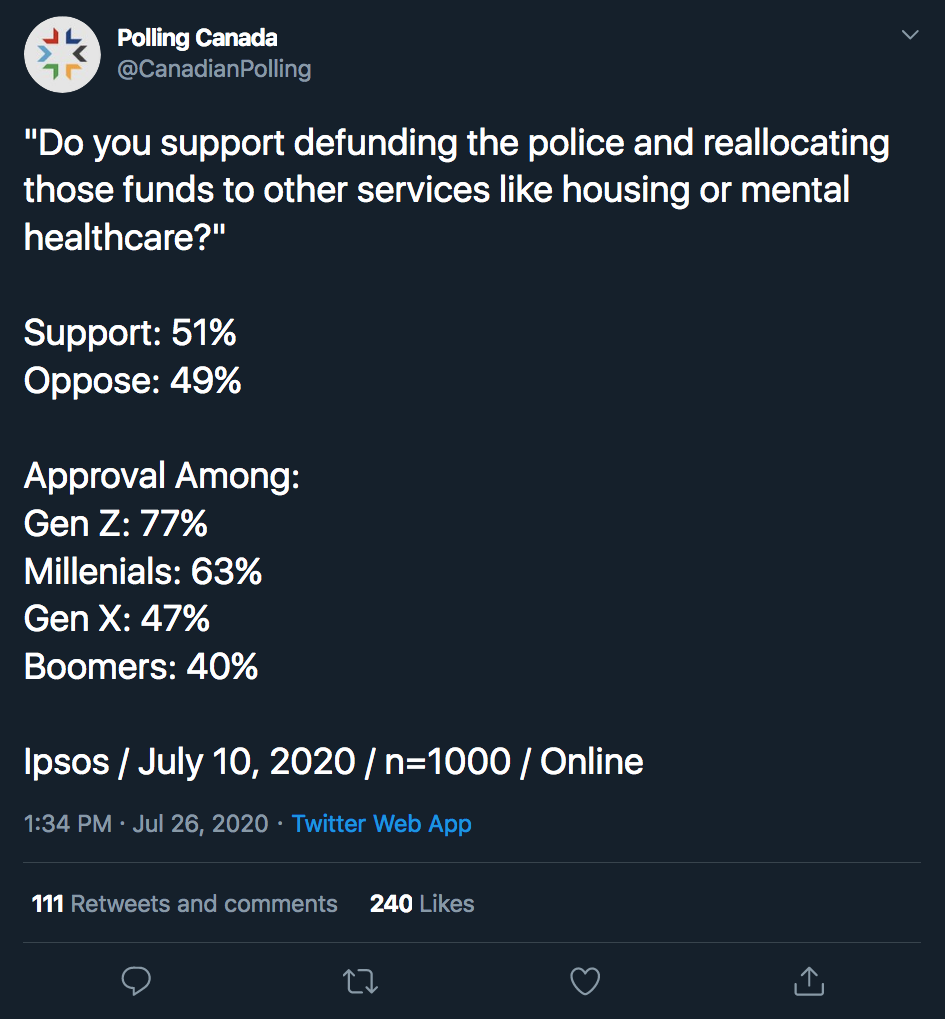
Poll: “Do you support defunding the police and reallocating those funds to other services like housing or mental healthcare?”
“This is definitely a historic moment because more and more people are finally having conversations that are no longer about reforming antiblack violence, through bodycams and more Black police,” says Batraville. Public opinion has indeed shifted dramatically; a recent Ipsos poll shows that the majority of Canadians are in favour of reallocating funds to community care and resilience. According to Batraville, these new conversations “are about actually working towards its abolition and investing in communities in which Black and Indigenous people, especially those who are poor, those with disabilities, those who are queer, trans, and two-spirit, can thrive.”
“Sometimes the gains are small, but we’re not going to be deterred by pitfalls,” adds Lopez. “We’re going to continue. The key is popular education and rallying support from other organizations so that we can put pressure on the government.”

